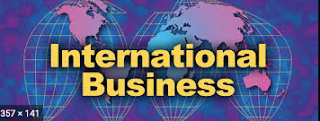- Get link
- X
- Other Apps
- Get link
- X
- Other Apps
CHAPTER 11 INTERNATIONAL BUSINESS
1. International business basically means commercial transactions that involve two or more countries.
a) Financial transactions
b) Business transactions
c) Monetary transactions
d) Commercial transactions.
2. Merchandise means goods that are --------------
a) Intangible
b) Tangible
c) Fictitious
d) Non-ficticious
3. The fundamental reason behind international business is that the countries cannot produce equally well or cheaply all that they need. This is because of the ---------------- among them or differences in their productivity levels.
a) Equal distribution of natural resources.
b) Unequal distribution of natural resources.
c) Difference in their population group.
d) Difference in ethnicity.
4. West Bengal specialises in --------------
a) Jute
b) Cotton
c) Silk
d) Steel
5. Maharashtra specialises in ---------------
a) Cotton textiles
b) Hosiery industry
c) Silk industry
d) Woollen fabrics.
6. Factors of production are, land, labour and -----------------
a) Inventory
b) Laws
c) Capital
d) Infrastructure
7. Factor mobility may involve the movement of factors between firms within -------------------, as when one steel plant closes but sells its production equipment to another steel firm.
a) The state
b) The industry
c) Country
d) The locality
8. consumers in most of the developing African and Asian countries are ----------------- and prefer to buy less expensive products.
a) Price sensitiveb) Sensitive to fashion changes
c) Sensitive to their culture and tradition
d) Sensitive to climate conditions.
9. But consumers in the developed countries like Japan, United States, Canada, France, Germany and Switzerland have a marked preference for ---------------- and high priced products due to their better ability to pay.
a) Fashionable products
b) Quality products
c) Durable products
d) Suitable products

Comments
Post a Comment